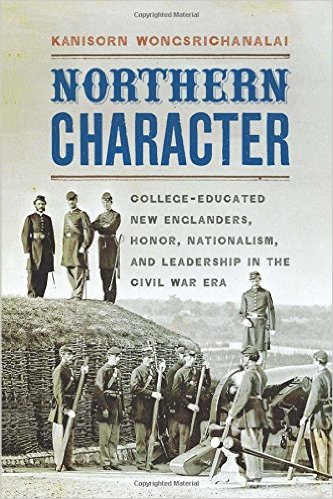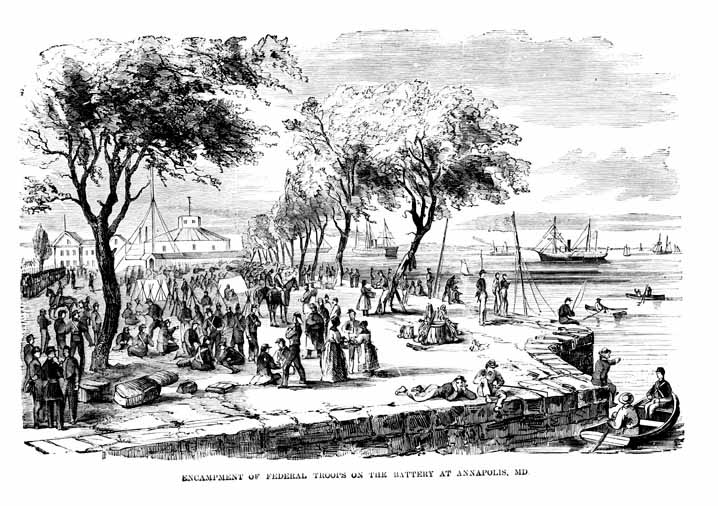Northern Character: College-Educated New Englanders, Honor, Nationalism, and Leadership in the Civil War Era by Kanisorn Wongsrichanalai. Fordham University Press, 2016. Paper, IBSN: 978-0823271825. $35.00.
 In Northern Character, Kanisorn Wongsrichanalai traces the intellectual lineage of elite white New Englanders before, during, and after the American Civil War. Wongsrichanalai argues that the New Brahmins—a group of young, wealthy, and well-educated elites centered in Boston—developed a code of character based on “individualism, civic responsibility, and societal leadership” (6). Unable to find suitable avenues to exhibit their character in the antebellum period, Brahmins viewed the outbreak of the Civil War as an opportunity to validate a New England-centric worldview, which extolled the principles of industry and free labor. By raising regiments, training new recruits, and leading men into battle, Brahmins believed that they had finally become men of “independent thought and selfless action” (2). Finally, with the Union victorious on the battlefield and Brahmins’ character vindicated by service, Wongsrichanalai argues that New Englanders helped to initiate the process of reconciliation by clasping hands with former Confederates.
In Northern Character, Kanisorn Wongsrichanalai traces the intellectual lineage of elite white New Englanders before, during, and after the American Civil War. Wongsrichanalai argues that the New Brahmins—a group of young, wealthy, and well-educated elites centered in Boston—developed a code of character based on “individualism, civic responsibility, and societal leadership” (6). Unable to find suitable avenues to exhibit their character in the antebellum period, Brahmins viewed the outbreak of the Civil War as an opportunity to validate a New England-centric worldview, which extolled the principles of industry and free labor. By raising regiments, training new recruits, and leading men into battle, Brahmins believed that they had finally become men of “independent thought and selfless action” (2). Finally, with the Union victorious on the battlefield and Brahmins’ character vindicated by service, Wongsrichanalai argues that New Englanders helped to initiate the process of reconciliation by clasping hands with former Confederates.
An essential component to the Brahmin worldview was a Whiggish interpretation of American history. Brahmins asserted that America embodied the New England values of industry, thrift, and conservatism, which they believed enabled the spread of civilization into the West. Indeed, the Brahmins offered Americans a vision of history that began with the Puritans and excluded slavery from the national historical narrative. Wongsrichanalai argues that New Englanders sought to incorporate all Americans under “the broad ideological umbrella of progress, industry, and freedom” (45). In doing so, Brahmins labeled slavery as an aberration in American history, which helped to establish “conflicting historical narratives between the North and South” (60).
Undergirding the Brahmin interpretation of American history was an ardent belief in American exceptionalism. For elite New Englanders, the Union was the embodiment of progress as well as the scion of “Western civilization and democratic ideals around the world” (60). Thus, when the Civil War erupted, Brahmins understood the conflict as an opportunity to test their personal character in defense of their country. Citing their education, they argued that they were uniquely qualified to fill the officer corps. Many Brahmins found it easier to demonstrate character by leading men into battle. In fact, many Brahmins, such as Oliver Wendell Holmes, Jr., longingly recalled their days in the army and asserted the war was a proving ground for their character development.
However, as the Union Army marched south, the Brahmins’ worldview was tested. Encountering un-free labor for the first time, Brahmins offered a paternalistic view of slaves and argued that freedmen could only be self-governing after years of education. While some Brahmins, including Robert Gould Shaw, were early supporters of the USCT, many New Englanders were skeptical of African American service and only reluctantly supported post-war Civil Rights legislation. Similarly, the Brahmin worldview was tested by poor white Southerners who, despite being free laborers, fought for un-free labor. Unable to rectify Southerners economic motives with their service in the Confederate Army, Brahmins believed that Southern gentlemen must have fought from a sense of duty and honor.
With a growing respect for Southern gentlemen’s selfless dedication to service, Brahmins argued that the destruction wrought by the war—as well as emancipation—was punishment enough for the South. Appalled by government corruption and an inability to recapture the glory of military service, many Brahmins sought to hasten the end of Reconstruction. In fact, New Englanders suggested that, “only a reunion of the educated classes could restore peace and prosperity to the region” (176). Since Brahmins believed that their vision of America had succeeded, the dictates of character called for Northern and Southern gentlemen to honor one another’s service. In the post-war years, many prominent Brahmins promoted reconciliation by commending the devotion of enlisted Confederates and blaming the war on radicals.
Even though Wongsrichanalai offers perceptive analysis of the Brahmin worldview, Northern Character has a few flaws. In particular, Wongsrichanalai fails to explore how Brahmins reacted when direct orders from superiors contradicted their code of character. For instance, Wongsrichanalai does not seriously analyze Brahmins’ understanding of the hard hand of war or Grant’s refusal to parole prisoners. These policies seemingly contradict the Brahmins’ belief in “selfless action.” More importantly, Northern Character undervalues the role of women in the formation of character. While Wongsrichanalai is clear about focusing on men in the Union Army, the lack of women in Northern Character is odd. Surely, mothers, sisters, wives, and daughters were deeply influential figures in how Brahmins developed not only their sense of self, but also their progressive worldview.
Despite these relatively minor issues, Northern Character sheds new light on a group of men whose influence on postwar America was undeniable. With Brahmins serving as governors, professors, judges, and presidents, Wongsrichanalai offers provoking insight into the intellectual development of America’s elite. In doing so, he offers intellectual historians and historians of the Civil War era a framework that may help untangle the underpinnings of reconciliation.
James G. Kopaczewski earned an M.A. in History at Villanova University. He is a doctoral student in History at Temple University.
